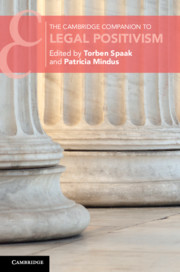Book contents
- The Cambridge Companion to Legal Positivism
- Cambridge Companions to Law
- The Cambridge Companion to Legal Positivism
- Copyright page
- Contents
- Figures
- Contributors
- Acknowledgements
- 1 Introduction
- Part I Fundamentals
- Part II History
- Part III Central Figures
- 9 Jeremy Bentham and the Origins of Legal Positivism
- 10 John Austin
- 11 The Normative Power of the Factual: Georg Jellinek’s Phenomenological Theory of Reflective Legal Positivism
- 12 Hans Kelsen’s Non-Reductive Positivism
- 13 The Legal Positivism of H. L. A. Hart
- 14 From Savigny to Linguistic Analysis: Legal Positivism through Bobbio’s Eyes
- 15 Joseph Raz’s Approach to Legal Positivism
- 16 Bulygin’s Analytical Legal Positivism
- Part IV Main Tenets
- Part V Normativity and Values
- Part VI Critique
- Index
- References
15 - Joseph Raz’s Approach to Legal Positivism
from Part III - Central Figures
Published online by Cambridge University Press: 21 January 2021
- The Cambridge Companion to Legal Positivism
- Cambridge Companions to Law
- The Cambridge Companion to Legal Positivism
- Copyright page
- Contents
- Figures
- Contributors
- Acknowledgements
- 1 Introduction
- Part I Fundamentals
- Part II History
- Part III Central Figures
- 9 Jeremy Bentham and the Origins of Legal Positivism
- 10 John Austin
- 11 The Normative Power of the Factual: Georg Jellinek’s Phenomenological Theory of Reflective Legal Positivism
- 12 Hans Kelsen’s Non-Reductive Positivism
- 13 The Legal Positivism of H. L. A. Hart
- 14 From Savigny to Linguistic Analysis: Legal Positivism through Bobbio’s Eyes
- 15 Joseph Raz’s Approach to Legal Positivism
- 16 Bulygin’s Analytical Legal Positivism
- Part IV Main Tenets
- Part V Normativity and Values
- Part VI Critique
- Index
- References
Summary
Bix considers that Joseph Raz might not be willing to accept that legal positivism is a theory, or stance, that is sufficiently well-defined to be captured in a few main tenets, thinking of it rather as a tradition of legal thinkers held together in a rather loose way. Bix focuses his discussion on Raz’s version of the social thesis, the so-called sources thesis, according to which all law is source-based, in the sense that the existence and content of the law is determined using exclusively factual (social) considerations. Bix considers Raz’s two main arguments in support of the sources thesis – the argument from authority and the argument from different functions – as well as certain objections to these arguments put forward by other legal philosophers.
- Type
- Chapter
- Information
- The Cambridge Companion to Legal Positivism , pp. 349 - 370Publisher: Cambridge University PressPrint publication year: 2021
References
- 3
- Cited by

